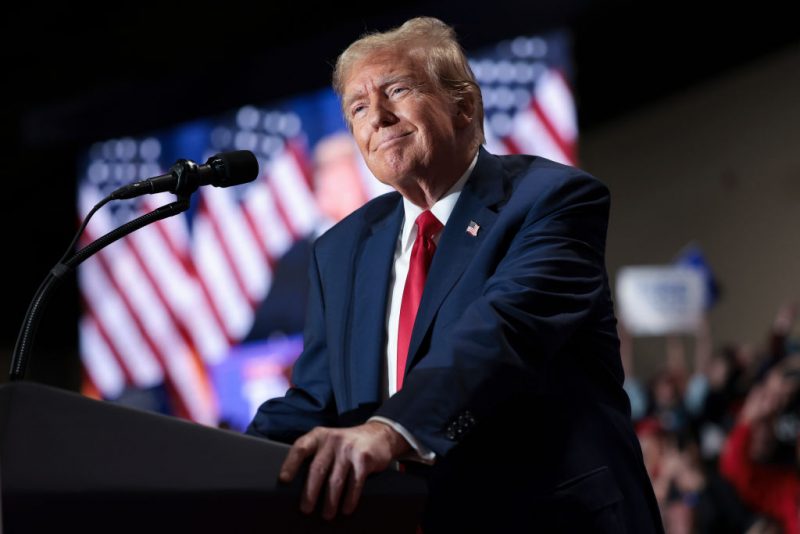Although we’re still in the early stages of Kamala Harris’s campaign, initial polling suggests President Trump performs as well, if not better, in a head-to-head contest against the vice president than he did against Joe Biden. Currently, Kamala Harris’s poll numbers are abysmal. She is the most unpopular vice president since modern polling began, with a 32 percent net favorability (compared with a 49% unfavorability rating), which is lower than both Dan Quayle and Dick Cheney, the architect of the universally despised Iraq War.
A recent poll by HarrisX/Forbes shows President Trump with a nine-point lead over Harris, 50% to 41%, which is higher than the lead that same poll gave him over Biden, 48% to 40%. When broken down by demographic groups, Trump’s numbers look even more promising: HarrisX/Forbes gives President Trump a +15-point advantage over Harris among Independents, 48% to 33%, and a staggering +19-point lead, 58% to 39%, among voters between the ages of 18 and 34.
Many polls are still recalibrating, but Sunday’s news of Joe Biden’s decision not to run for re-election has made Kamala Harris the new Democratic candidate. Early poll numbers in key battleground states indicate that President Trump performs at least as well against Harris as he did against Biden. For example, FiveThirtyEight gives President Trump a 6-point lead in Arizona, compared to the 5-point lead he had there over Biden. Similarly, Trump’s lead in Michigan increased by 1% over Harris compared to Biden, with a 46% to 41% lead. Trump also maintains sizable leads in both North Carolina and Pennsylvania over Harris, albeit by slightly smaller margins. Another poll even has Trump leading Harris in New Hampshire by a point.
Betting markets, which often gauge national sentiment better than polls, give President Trump a significant advantage. Polymarket, a leading prediction market, places Trump’s odds of winning the general election at 64%, compared with 33% for Harris. Other betting markets, such as Oddschecker, BetOnline, and Bovada, also designate Trump as the overwhelming favorite to win the presidency.
Since Biden’s decision, the media has been fervently supporting the Democratic nominee, feeling reinvigorated by the chance to back someone other than Biden. Harris has also benefited from a financial windfall, reportedly raising more than $100 million between Sunday afternoon and Monday evening. This influx of funds has replenished Democratic coffers, which had been lagging behind Trump’s fundraising efforts. Harris has secured enough of Biden’s pledged delegates, which will be released at next month’s DNC, to secure the nomination. This has buoyed the Democrats and lifted Harris’s campaign.
Polling is likely to reflect this newfound momentum, but the good news for the Trump campaign is that Harris’s polls may be at their peak now. Once Harris’s appeal begins to fade and Democratic donors realize she is as bad, if not worse, a candidate than Biden, the search for a new candidate could restart. Before Harris fever took hold, the New York Times ranked her as the least electable among ten possible Democratic nominees.
Despite endorsements from Biden, Pelosi, and Hillary Clinton, there is still a chance Harris may not be the Democratic nominee. Notably, the lack of an endorsement from Obama suggests he is betting on a contested convention or is waiting to see if Harris has real longevity. A cautious approach is wise, as she is unlikely to galvanize the party faithful. Harris’s public persona is off-putting to many Americans, and she has never endeared herself to any constituency in her political career.
Harris’s inability to garner significant support in the 2020 primary is further proof of her likeability and personality issues. Unlike Hillary Clinton, a political veteran with ambitious and strategic qualities, Harris is seen as a political lightweight. Her public statements, such as her description of the Russia-Ukraine war, have been criticized as simplistic and tone-deaf. Her attempts to appear relatable often fall flat.
While Harris is likely to be the Democratic nominee, her candidacy should not be considered a certainty. Media enthusiasm for her campaign will likely be short-lived, especially as new polls reveal she is as problematic a candidate as Biden. Her recent poll numbers suggest she benefits more from Biden’s implosion than any natural political gifts. In a general election, “not being Biden” will wear off, and Harris will have to contend with her own track record and widespread unpopularity.
A recent poll from the Democracy Institute found that over six in ten Americans view Harris’s campaign as undemocratic, perceiving her as a makeshift candidate forced upon an unwilling populace. Despite Biden’s incompetence, Harris has not exercised the 25th Amendment or addressed his cognitive decline, choosing instead to cover for him and put millions at risk. This complicity will likely damage her campaign.
Harris’s campaign is seen by some as “dead on arrival” because it is perceived to be propped up by shadowy actors rather than genuine grassroots support. Like Biden, she is viewed as a puppet for a more nefarious operation, which undermines her acceptance by the electorate. Harris’s campaign could face significant challenges, and her odds of winning may be compromised by these perceptions and her own political shortcomings.
 Telegram is where we really talk. Don't miss out!
Telegram is where we really talk. Don't miss out!







